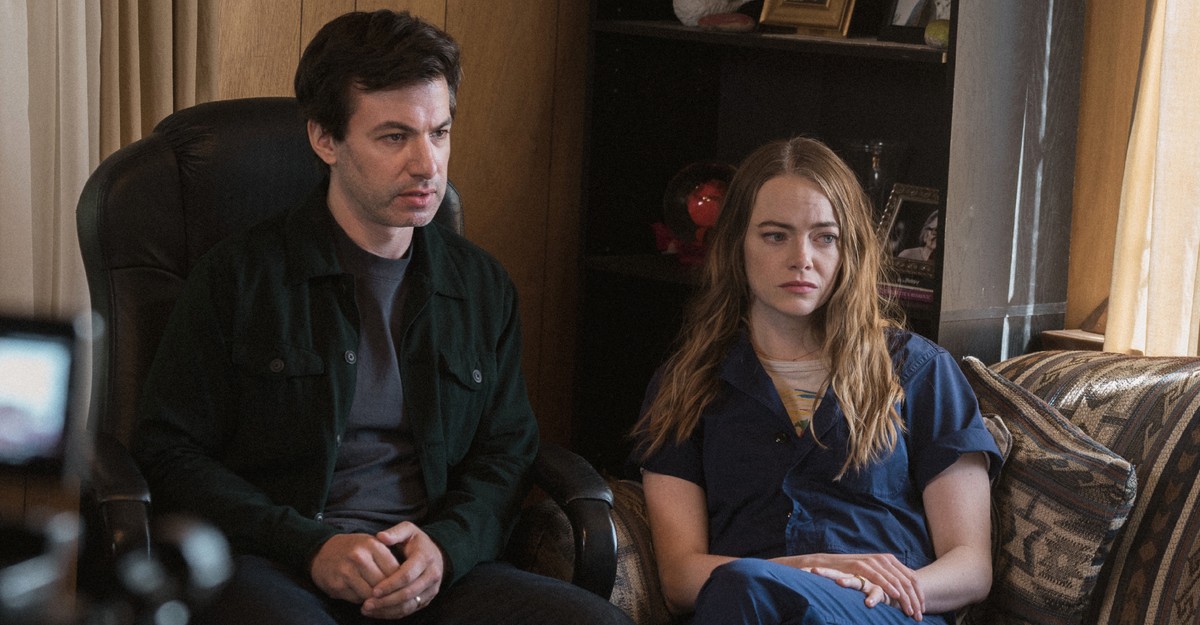
Watching something made by Nathan Fielder can be an act of endurance. The creator, host, and star of shows such as Nathan for You and The Rehearsal has cultivated a reputation as a merry prankster and a mastermind of hallucinatory television. On-screen, he tends to be deadpan and awkward, making himself the butt of the joke as regularly as he messes with the ordinary people he meets. When he pushes uncomfortable bits to their extreme, you can feel like your mind is short-circuiting, the deluge of his off-kilter, often meta humor leaving you delighted and disturbed. So the best way to watch Fielder’s work, I’ve long accepted, is to persist until the punch line reveals itself.
And yet, I was still caught off guard by The Curse, the new Showtime series Fielder co-created with the filmmaker and actor Benny Safdie (Uncut Gems). I needed breaks between episodes, even pausing in the middle of scenes the deeper I went into the season, fearful of what would happen next. The show is unlike Fielder’s previous output. For one thing, it’s fully scripted—a 10-episode story packed with surreal set pieces and cinematic plot twists. For another, Fielder acts, and not just as a version of himself.
Fielder plays Asher, a man who, with his wife, Whitney (Emma Stone), and their producer, Dougie (Safdie), is trying to make a show for HGTV called “Flipanthropy.” Their program is ostensibly meant to demonstrate how building eco-conscious homes and introducing new businesses into the diverse city of Española, New Mexico, can be beneficial to existing residents, but the pressure of their endeavor drives their work—and Whitney and Asher’s marriage—sideways. Whitney and Asher want to be considered good people, but they often care more about appearances than about following through on their promises. Dougie, meanwhile, is certain that these two wannabe HGTV stars’ ethical concerns won’t turn their show into a hit, so he manipulates them in order to make the project more dramatic.
The Curse tears apart the artifice of reality television while simultaneously questioning morality’s place in entertainment. The result is weird, off-putting, and hard to watch, yet it offers an intensely compelling character study. The series scrutinizes what happens to people when the camera is turned on them—and whether their on-camera selves match who they really are. When Dougie forces Asher to give money to a little girl so they have more footage of him doing good deeds, Asher tries to take the money back after giving her a $100 bill, the only cash he had in his wallet. (The girl subsequently casts a “curse” on him, hence the series’ title.) When Asher and Whitney have a cute private moment in their home, Whitney tries to reenact it so she can post it to her Instagram, only for the two to look absurdly unnatural. Fielder directed most of the episodes, and his camerawork—along with an eerie score produced by Safdie’s longtime collaborator Daniel Lopatin—helps the story feel more unsettling too: He frames Whitney and Asher through windows and doorways, capturing them from odd angles. The desert sun overwhelms most scenes, its glare casting a harsh spotlight over Española. And the eco-friendly homes Whitney designs use mirrors as their siding, warping Whitney and Asher’s reflections.
The setting feels like a trap of Whitney, Asher, and Dougie’s own making. The Curse differentiates itself from other satires of Hollywood by rising above typical backstage antics—fights with executives, bickering calls with talent agents—and highlighting the narcissism of creating a positive public image. Whitney chases after Cara (Nizhonniya Austin), a Native artist she admires, fawning over her pieces and trying to get her to join the show as a consultant—all while failing to accept how little Cara thinks of Whitney’s pandering. Asher, hoping to protect his wife from negative headlines about her family (her parents are landlords notorious for exploiting and evicting poor households), attempts to bribe a journalist into scrapping her investigation by arguing that he and Whitney deserve a chance to prove their benevolence. Everybody is capable of trying to do good, the series posits. But no one can be all good, all the time, especially when a camera is involved.
The show makes this point over and over in ways that border on didactic, especially when several episodes run close to or more than an hour long. But The Curse makes up for its indulgent length with its cast, who deftly convey the complicated, pathetic reality of their characters. Stone in particular delivers a savage performance, showing Whitney’s desperate need for validation and dogged disregard for her own flaws. Plus, the show is consistently sharp in its dissection of its protagonists’ insecurities. Whitney and Asher know that their “passive” homes don’t actually help mitigate climate change, and they know that they’re not being truthful when they cast actors to replace real buyers who don’t seem grateful enough. Yet they have convinced themselves that the ends justify the means—that because they believe their mission is philanthropic, all that matters is that their show triumphs. That’s the real curse The Curse explores: the awful, stubborn human habit of constructing self-serving narratives to avoid uncomfortable truths.
Or maybe, the series also suggests, there’s no curse at all—just an inflexible, inevitable world of haves and have-nots, of the privileged and the disadvantaged, of people destined to fail up and people who must struggle endlessly to succeed. The show exhibits a nihilistic streak amid its heady deconstruction of its ensemble’s ethics, and it’s often wildly silly. The finale, the plot details of which Showtime has asked critics not to divulge, is a total head-scratcher—a meaty, baffling, ludicrous, and contemplative episode I have not stopped thinking about. But then again, I should have known this would happen. If Fielder is at all involved in what I’m watching, it’s best to accept that no amount of preparation is enough—and that no laugh comes without a full-body squirm.
